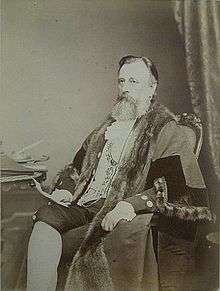Benjamin Scott
Benjamin Scott (1814–1892) served as Chamberlain of the City of London from 1858 until his death. He was also a committed social activist of the age working with figures such as Josephine Butler and W. T. Stead.

Life
The son of Benjamin Whinnell Scott, Chief Clerk to the Chamberlain of London, he was born in 1814 in Stoke Newington, and entered the Chamberlain's office as a junior clerk. In 1841 upon the death of his father, he succeeded him as Chief Clerk, and remained in the service of the Corporation in that capacity during the Chamberlainship of Sir James Shaw, Sir William Heygate, and Anthony Brown.[1] Scott was the grandson of the banker John Scott, an abolitionist and a founding member of the Peace Society.
Chamberlain of the City of London
On the death of Brown early in 1853, Scott received a requisition, as a liveryman of the Wheelwrights' Company, to stand for Chamberlain; the office was in the gift of the liverymen of the various Livery companies. For nearly a century the post had been filled from the ranks of aldermen who had been Lord Mayor of London. Scott had for his opponent Alderman Sir John Key, who had been twice Lord Mayor (in 1830 and 1831). After a four days' poll, costing the candidates £10,000, Key was elected by a small majority (224 votes).[1]
At the end of 1853, after continuing friction produced by the contest, Scott resigned his appointments under the corporation, and a year later became secretary of the new Bank of London, which he had taken part in establishing. In July 1858, on the death of Sir John Key, he again became a candidate for the office of Chamberlain, and was elected without opposition. As a shrewd financier Scott enabled the corporation to weather Black Friday of the panic of 1866 without loss.[1]
Purity campaign
With Josephine Butler, W. T. Stead and the Salvation Army, Scott agitated for an increase of the age of consent, which was 12 years in the UK for most of the 19th century.[2] Scott and Alfred Stace Dyer set up the London Committee for Suppressing the Traffic in British Girls for Purposes of Continental Prostitution in 1879, in the name of "social purity" and an end to the double standard in sexuality, with support from Butler and other campaigners against the Contagious Diseases Acts.[3]
Dyer and Scott were both members of the Gospel Purity Association that in April 1885 tried a prosecution to shut down a brothel run by a notorious London madam, who was defended by Montagu Williams and got off with a fine.[4] May 1885 saw a change of tactics, the case having shown prostitution had support in high places.[5] In the run-up to the sensational Eliza Armstrong case, Scott met with Bramwell Booth and Stead at Salvation Army Headquarters, in an effort to get Stead to publish a child prostitution story in the Pall Mall Gazette.[6] The campaign culminated in the passing of the Criminal Law Amendment Act 1885, and Scott published an account of his efforts in a pamphlet, Six Years of Labour and Sorrow.[1]
Interests and works
Scott was a nonconformist, temperance advocate, and social reformer; and worked for the abolition of church rates, the promotion of ragged schools, state education, and preservation of open spaces. Towards the endowment of the nonconformist church in Southwark in memory of the Pilgrim Fathers he contributed £2,000.[1]
In his spare time Scott lectured to working class audiences, and in December 1851 was the chief promoter of the Working Men's Educational Union. For the Union he wrote and published Lectures on the Christian Catacombs at Rome, Lectures on Artificial Locomotion in Great Britain, and a Manual on Popular Lecturing. He was a fellow of the Royal Astronomical Society, and in 1867 published a Statistical Vindication of the City of London.[1]
His other publications include:[1]
- The Pilgrim Fathers; neither Puritans nor Persecutors, 1866; 2nd edit. 1869.
- Suggestions for a Chamber of Commerce for the City of London, 1867.
- Municipal Government of London, 1882.
- London's Roll of Fame, 1884, a collection of addresses and replies on occasions when the freedom of the city was granted, during the previous 127 years.
- A State Iniquity - its Rise, Extension and Overthrow: A Concise History of the System of State Regulated and Licensed Vice, 1890
Family
He married Kate Glegg, daughter of Captain Thomas Glegg (of the Dragoon Guards) and his wife Sophia, on 2 August 1842 at Byfleet in Surrey, with whom he had four children.
Death
Benjamin Scott died on 17 January 1892, and was buried in Weybridge cemetery with his wife, who predeceased him by three days, it was understood as a result of the influenza pandemic which he had in turn contracted. He had continued in his official duties until within a short time of his death.[1]
Notes
- Lee, Sidney, ed. (1897). . Dictionary of National Biography. 51. London: Smith, Elder & Co.
- Patricia Hollis (20 May 2013). Women in Public, 1850-1900: Documents of the Victorian Women's Movement. Routledge. p. 200. ISBN 1-136-24790-4.
- Anne Cossins (2000). Masculinities, Sexualities, and Child Sexual Abuse. Martinus Nijhoff Publishers. p. 8 note 6. ISBN 90-411-1355-X.
- Julia Laite; Laite Julia Palgrave Connect (2 December 2011). Common Prostitutes and Ordinary Citizens: Commercial Sex in London, 1885-1960. Palgrave Macmillan. p. 54. ISBN 978-0-230-35421-0.
- Gretchen Soderlund (3 June 2013). Sex Trafficking, Scandal, and the Transformation of Journalism, 1885-1917. University of Chicago Press. pp. 29–30. ISBN 978-0-226-02136-2.
- David Malcolm Bennett (1 December 2003). The General: William Booth. Xulon Press. pp. 216–7. ISBN 978-1-59467-206-4.
Attribution
![]()